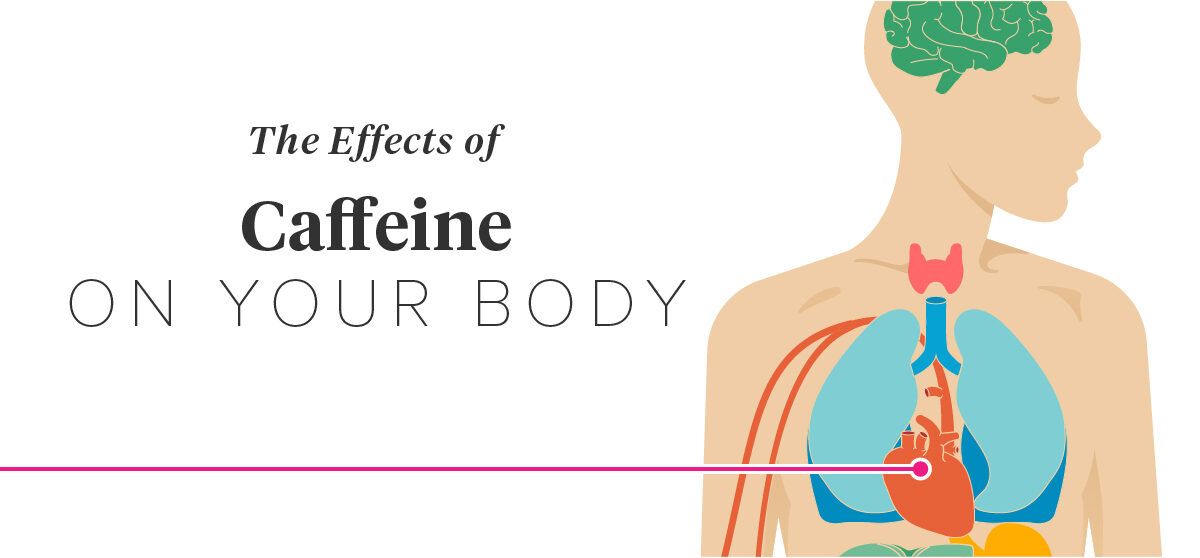
Hey there! Have you ever wondered what caffeine does to your health? Well, you’re in luck because in this article, we’re going to explore the various effects of caffeine on your overall well-being. From its energizing properties to potential side effects, we’ll dive into all the fascinating details. So grab your favorite cup of coffee, sit back, and let’s discover how caffeine impacts your health.
Physical Effects
Positive Effects
Caffeine can have several positive effects on your physical health. One of the main benefits is increased energy levels. When you consume caffeine, it stimulates your central nervous system, making you feel more alert and awake. This can help you combat tiredness and stay focused throughout the day.
Another positive effect of caffeine is its ability to improve physical performance. It stimulates the release of adrenaline, which can increase your heart rate and improve muscle contractions. This can result in enhanced endurance and reduced fatigue, making it easier for you to engage in physical activities and exercise.
Negative Effects
While caffeine can offer some benefits, it’s important to be aware of its potential negative effects on your physical health. One of the most common side effects is increased stomach acid production. This can lead to issues such as heartburn, acid reflux, and stomach ulcers, particularly if you consume large amounts of caffeine or have a sensitive stomach.
Caffeine also has a diuretic effect, which means it makes you urinate more frequently. This can lead to dehydration if you don’t replenish the lost fluids. Additionally, excessive caffeine consumption can disrupt your sleep patterns, leading to sleep disturbances and insomnia.
Mental Effects
Increased Alertness
One of the primary mental effects of caffeine is increased alertness. Caffeine acts as a stimulant, blocking the receptors in the brain that make you feel tired. This can help you stay focused and alert, particularly during times of fatigue or when you need to concentrate on a task.
Improved Cognitive Function
Caffeine has been shown to improve cognitive function, including memory, attention, and reaction time. When consumed in moderate amounts, it can enhance your brain’s ability to process information and make decisions. This is why many people rely on a morning cup of coffee to kick-start their mental alertness and productivity.
Anxiety and Restlessness
For some individuals, caffeine can have negative effects on mental well-being. It can increase anxiety levels and lead to restlessness or jitters. This is because caffeine stimulates the release of adrenaline, which can trigger a fight-or-flight response. If you are already prone to anxiety or have a sensitivity to stimulants, you may want to limit your caffeine intake or opt for decaffeinated options.
Sleep Disturbances
Consuming caffeine, especially later in the day, can interfere with your sleep patterns. The stimulating effects of caffeine can make it difficult for you to fall asleep or can cause wakefulness throughout the night. This can result in sleep disturbances, leading to daytime sleepiness and a decrease in overall sleep quality. It’s recommended to avoid consuming caffeine at least six hours before bedtime to minimize the impact on your sleep.
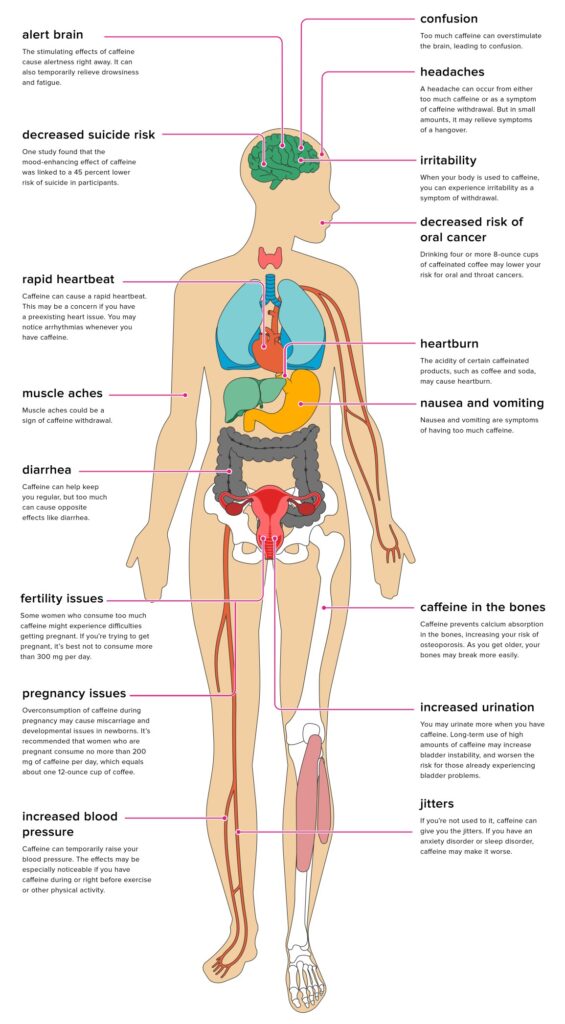
This image is property of i0.wp.com.
Digestive Effects
Increased Stomach Acid
One of the physical effects of caffeine on the digestive system is an increase in stomach acid production. Caffeine stimulates the release of gastric acid, which can potentially irritate the lining of your stomach. This can lead to symptoms such as heartburn, acid reflux, and stomach discomfort, particularly in individuals with pre-existing digestive conditions.
Gastrointestinal Issues
In addition to increased stomach acid, excessive caffeine consumption can cause gastrointestinal issues such as stomach cramps, bloating, and diarrhea. These effects may be more pronounced in individuals who are sensitive to caffeine or those who consume large amounts of it regularly. If you experience digestive discomfort after consuming caffeine, it may be helpful to reduce your intake or avoid it altogether.
Cardiovascular Effects
Increased Heart Rate
One of the immediate effects of caffeine on the cardiovascular system is an increase in heart rate. This is because caffeine stimulates the release of adrenaline, a hormone that can temporarily raise your heart rate. While this effect is usually mild and transient, individuals with underlying heart conditions may need to be cautious about their caffeine intake to avoid potential complications.
High Blood Pressure
Caffeine can also cause a temporary increase in blood pressure. This is because it constricts your blood vessels, making it harder for blood to flow freely. If you already have high blood pressure or are at risk for cardiovascular problems, excessive caffeine consumption may worsen your condition. It’s advisable to monitor your blood pressure regularly and consult with your healthcare provider about your caffeine intake if you have concerns.
Arrhythmias
In rare cases, excessive caffeine consumption can trigger abnormal heart rhythms, known as arrhythmias. These irregularities can range from mild palpitations to more serious conditions, such as atrial fibrillation. Individuals with a history of heart problems or sensitivity to stimulants should be mindful of their caffeine intake and seek medical advice if they experience any concerning symptoms.
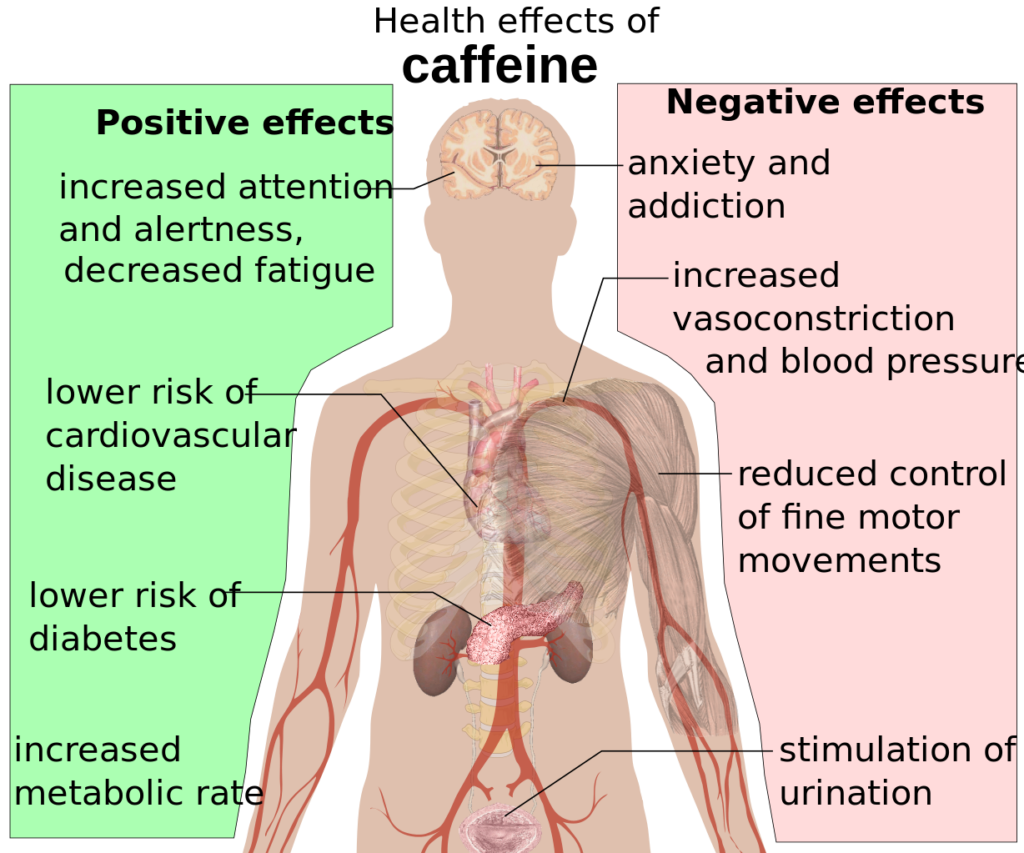
This image is property of teajourney.pub.
Respiratory Effects
Bronchodilation
One positive effect of caffeine on the respiratory system is its ability to promote bronchodilation. This means that caffeine can help relax and open up the airways, making it easier to breathe. This effect can be particularly beneficial for individuals with respiratory conditions such as asthma.
Bronchoconstriction
However, it’s also important to note that caffeine can have the opposite effect in some individuals, causing bronchoconstriction. This means that the airways may narrow, making breathing more difficult. While this effect is less common, individuals who experience increased respiratory symptoms after consuming caffeine should be cautious and consider reducing their intake.
Urinary Effects
Diuretic Effects
Caffeine is a mild diuretic, meaning it increases urine production. This can result in more frequent urination and potentially lead to dehydration if you don’t replenish lost fluids. While the diuretic effect of caffeine may be beneficial for individuals who need to increase their fluid output, such as those with edema, it’s important to ensure adequate hydration by drinking enough water throughout the day.
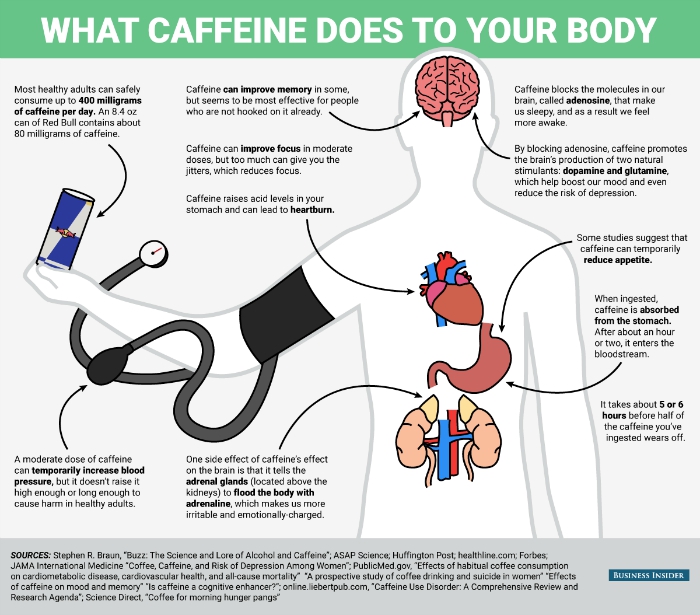
This image is property of www.sciencealert.com.
Musculoskeletal Effects
Muscle Tremors
Caffeine stimulates the release of neurotransmitters that can cause muscle twitching or tremors. This effect is usually minor and temporary, but individuals who are sensitive to stimulants may experience more pronounced muscle movements. If you notice excessive tremors or muscle twitching after consuming caffeine, it may be advisable to reduce your intake or choose decaffeinated options.
Reduced Fatigue
Caffeine can temporarily reduce fatigue and improve muscle endurance. By blocking the receptors in the brain that promote tiredness, caffeine can help you stay more alert and energized during physical activities. It can also enhance your ability to perform repetitive tasks, such as lifting weights or running, by reducing the perception of fatigue. However, it’s important to note that relying solely on caffeine for energy can mask underlying fatigue and lead to overexertion.
Reproductive Effects
Fertility Issues in Women
Excessive caffeine consumption has been associated with fertility issues in women. Studies have shown that high caffeine intake can decrease the chances of conceiving and increase the risk of miscarriage. If you are trying to conceive or are pregnant, it’s advisable to limit your caffeine intake to ensure optimal reproductive health.
Reduced Sperm Quality in Men
Caffeine consumption has also been linked to reduced sperm quality in men. High levels of caffeine in the body can impair sperm motility and increase the risk of DNA damage, which can affect fertility. If you and your partner are planning to start a family, it may be beneficial for both of you to limit your caffeine intake to support reproductive health.
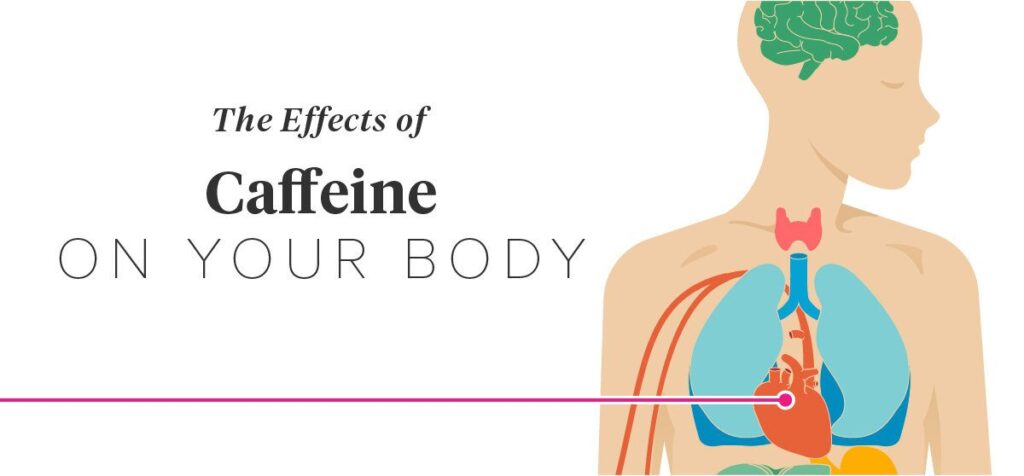
This image is property of media.post.rvohealth.io.
Withdrawal Effects
Headaches
Caffeine withdrawal can cause headaches, which are often described as throbbing and intense. These headaches can be triggered within 12 to 24 hours of reducing or stopping caffeine consumption. They usually resolve within a few days, but can be quite uncomfortable. Gradually reducing your caffeine intake or seeking medical advice can help manage withdrawal symptoms.
Irritability
Withdrawal from caffeine can also lead to irritability and mood changes. The sudden absence of caffeine can disrupt the brain’s chemistry, resulting in feelings of irritability, impatience, and even depression. These symptoms are usually temporary and subside as your body adjusts to reduced caffeine levels.
Fatigue
When you stop consuming caffeine, you may experience increased fatigue and a lack of energy. This is because your body has become dependent on caffeine to stimulate the central nervous system and keep you awake. It may take a few days to a week for your energy levels to normalize, and during this time, it’s important to prioritize rest and allow your body to adjust.
Interaction with Medications
Stimulants
Caffeine can interact with other stimulant medications, potentially increasing their effects or side effects. It’s important to be cautious if you are taking medications such as amphetamines, methylphenidate, or other stimulant drugs, as combining them with excessive caffeine intake may lead to overstimulation, increased heart rate, or high blood pressure.
Antidepressants
Caffeine can also interact with certain antidepressant medications, such as selective serotonin reuptake inhibitors (SSRIs) and monoamine oxidase inhibitors (MAOIs). It can potentially increase the risk of serotonin syndrome, a serious condition that results from excessive serotonin levels in the brain. It’s crucial to consult with your healthcare provider if you are taking antidepressant medication and have concerns about your caffeine consumption.
Antibiotics
Some antibiotics, notably fluoroquinolones, can interact with caffeine and inhibit its metabolism, leading to increased caffeine levels in the body. This can potentially enhance the effects of caffeine, including its stimulant and cardiovascular effects. If you are prescribed antibiotics and consume caffeine regularly, it’s advisable to discuss this with your healthcare provider to ensure optimal medication management.
In conclusion, caffeine can have various effects on your physical, mental, and reproductive health. While it can provide benefits such as increased alertness and improved cognitive function, it’s important to be mindful of potential negative effects, including increased stomach acid, sleep disturbances, and cardiovascular issues. Moderation and individual sensitivity should be considered when determining your caffeine intake. If you have any pre-existing medical conditions or are taking medications, it’s essential to consult with your healthcare provider regarding the potential interactions and effects of caffeine. By being informed and making conscious choices, you can better understand how caffeine affects your health and make decisions that promote your overall well-being.

This image is property of andytherd.com.